How Saudi officials wooed Nigerian doctors in Lagos, Abuja
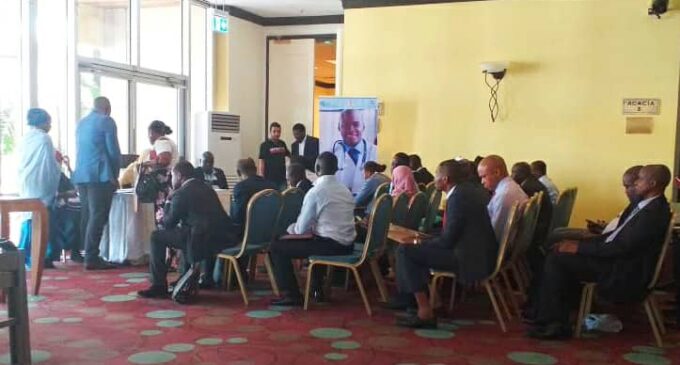
Sodiq Abubakar (not real name) was not going to miss this once-in-a-lifetime opportunity; it was prayers answered for him and he was ready to deploy all his resources to get the job. And so as early as 6:30am, he joined hundreds of other doctors outside the Ladi Kwali Hall of Sheraton Hotel, Abuja, for the recruitment exercise being organised by the Saudi Arabian ministry of health. The ministry, according to a document seen by TheCable, was seeking to employ medical consultants, specialists and medical officers in various fields with priority areas such as anaesthesia, ICU, paediatrics, surgery, emergency and internal medicine as well as ophthalmology.
Abubakar currently works at a popular university teaching hospital in the north-west where he earns “around N600,000” a month as a consultant but the Saudi health ministry is proposing something much juicier: between $3,000 (equivalent of N1 million) and $8,333 (equivalent of N3 million) as monthly salary. “So, why won’t I leave (Nigeria)? Even the minister of health will join us here (for the interview) if he has his way,” he said when presented the option of continuing work in Nigeria.
A similar recruitment exercise was held in Lagos and the number was about five times higher than the approximately 300, who attended the two sessions in Abuja. “The whole place (in Lagos) was full that people had to stay outside; more than 700 came that day,” a doctor told his colleague.
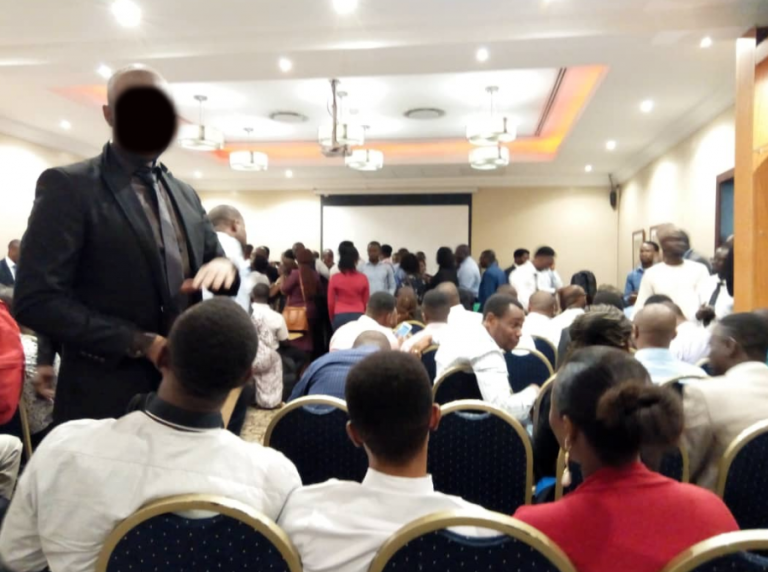
The recruitment exercise in Lagos.
In Abuja, while the Saudi personnel interviewed applicants in an inner room, officials of MEED Consultants, the agency handling the recruitment, attended to applicants outside the hall. The exercise started at 7am but doctors who arrived around 9am had to wait for vacant seats — and for green pastures.
THE REAL ISSUES FORCING DOCTORS OUT OF NIGERIA

Doctors protesting unpaid salaries
Can there ever be a Nigerian healthcare system without constant strikes, threats and protests? Between 2017 and now, doctors in Nigeria have embarked on strike actions on numerous occasions, usually as a result of issues which are taken for granted overseas but need to be fought for in the country: salaries, upgrade of health facilities and general welfare.
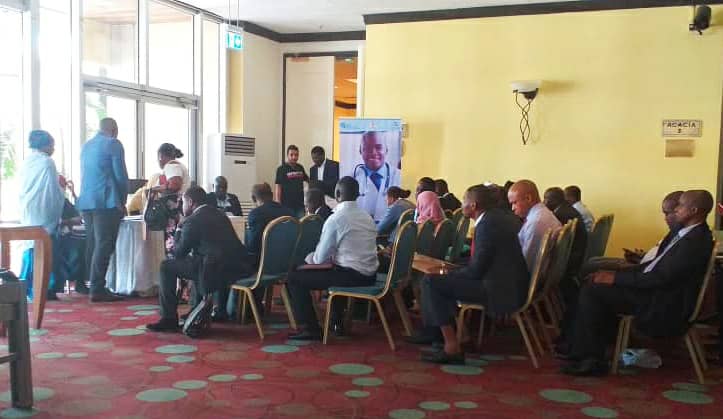
The recruitment exercise in Abuja
In 2018, for instance, the Joint Health Sector Union (JOHESU) embarked on a six-week strike to press home its demands bordering on improved healthcare facilities and welfare, most prominent among them being to have equal pay with their counterparts in the Nigerian Medical Association (NMA). And while the strike lasted, the NMA threatened to down tools if the government acceded to JOHESU’s demands on equal pay. The day JOHESU ended its strike, the Nigeria Association of Resident Doctors (NARD) threatened to start another industrial action over the refusal of the federal government to reinstate its sacked colleagues. Meanwhile, JOHESU has returned in 2019, threatening another strike over similar demands particularly the “poor condition of most hospitals” across the country.
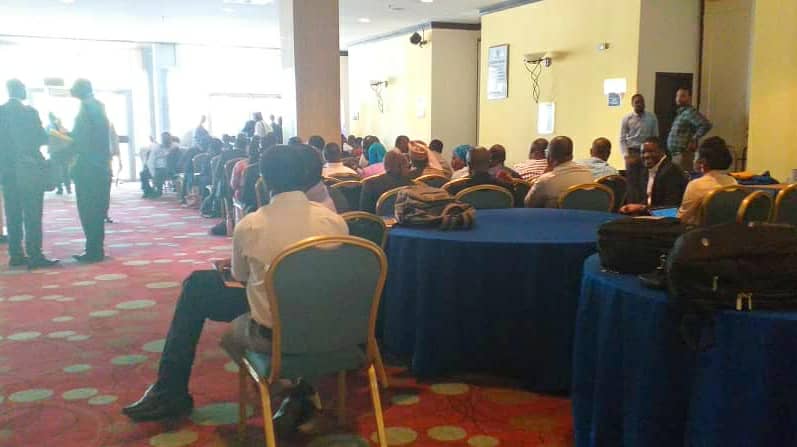
Nigerian doctors waiting to be interviewed at Sheraton Hotel, Abuja
The situation is even worse at the state level where the various unions down their tools more frequently. Towards the end of last year, medical doctors in Abia threatened to embark on strike over 10-month salary arrears; non-payment of salaries, pensions and gratuities running over eight months also forced their counterparts in Benue to go on an indefinite strike in 2017. In January, resident doctors in Anambra resolved to go on strike over the issue of poor funding. Lagos State University Teaching Hospital was shut down for three days in January as a result of the state government’s “failure to employ enough house officers and residents doctors at the hospital”. In 2018, the incessant kidnap of medical doctors in Cross River forced the NMA in the state to also down their tools.
And so the list goes on: poor remuneration today, lack of facilities tomorrow. “How do you expect doctors to perform well and live long with this kind of situation,” asked one of the doctors who attended the recruitment exercise in Abuja. “Nigeria has finished us. In places like UAE, your work is even less stressful with higher pay.”
LACK OF FUNDING A MAJOR CHALLENGE

Despite being Africa’s biggest economy with a GDP of $397.47 billion at the end of 2018, Nigeria still hasn’t come close to prioritising the health sector as it should. A close look at the budgetary allocation for health from 1999 to 2019 points to the root cause of the problem: gross under-funding. Sadly, the budget provisions for the sector for most of the years have continued to fall short of standards of the Abuja Declaration Act of 2001 in which African Union countries agreed to allocate at least 15 percent of their annual budget to health.
In the last 10 years, the highest budgetary allocation for the health sector was N377 billion — and that was from a budget of N7.4 trillion.
Below is the budget for the health sector in the last decade:
| S/N | YEAR | ANNUAL BUDGET (N) | HEALTH SECTOR ALLOCATION (N) | PERCENTAGE (%) |
|---|---|---|---|---|
| 1 | 2010 | 4.6trn | 164bn | 3.6% |
| 2 | 2011 | 4,2trn | 235bn | 5.6% |
| 3 | 2012 | 4.9trn | 282bn | 5.8% |
| 4 | 2013 | 4.99trn | 282bn | 5.7% |
| 5 | 2014 | 4.96trn | 264bn | 5.3% |
| 6 | 2015 | 4.4trn | 259bn | 5.9% |
| 7 | 2016 | 6.06trn | 250bn | 4.1% |
| 8 | 2017 | 7.4trn | 377bn | 5% |
| 9 | 2018 | 9.12trn | 269bn | 3% |
| 10 | 2019 | 8.8trn (proposed) | 315bn | 3.6% |
BRAIN DRAIN
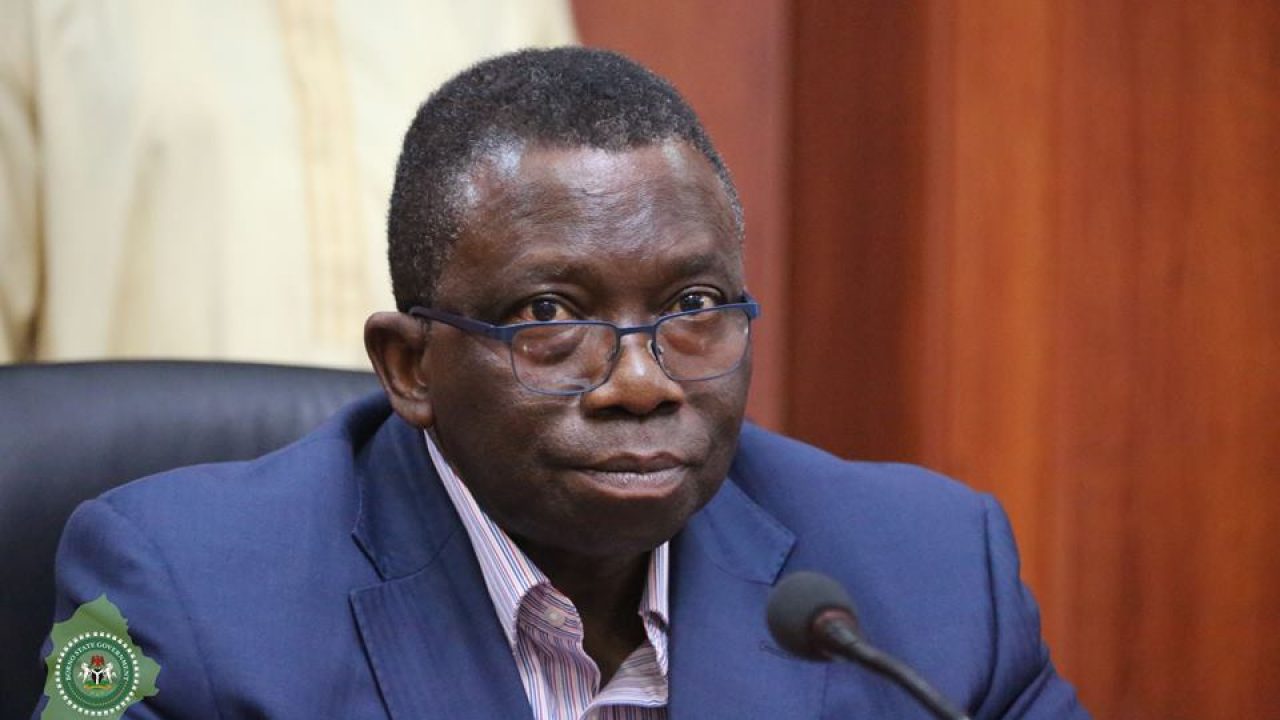
In 2017, NOI polls conducted a survey which showed that the United Kingdom and the United States were the top destinations where Nigerian medical doctors seek work opportunities. In 2018, a research by Africa Check showed that at least 12 doctors leave Nigeria for the UK every week! And according to the UK General Medical Council which holds on doctors in the UK, 5,250 Nigerian doctors were working in the UK as of April 25, 2018.
But here is the terrifying thing: The NOI survey found out that nine in 10 — Nigerian doctors were seeking opportunity to go and practise abroad – and while 98 percent of the respondents cited high taxes & deductions from salary as challenges that force doctors to consider leaving abroad, 92 percent gave their reasons as low work satisfaction while 91 percent cited poor salaries & emoluments.
CITIZENS AT THE RECEIVING END
In the end, citizens suffer as a result of the brain drain and in most cases, end up not receiving the adequate medical attention. Statistics from the World Health Organisation (WHO) showed that as at 2013, there were 3.8 doctors for every 10,000 Nigerians, far below the organisations’s recommendation of one doctor to 600 patients. But recent data from the Medical and Dental Council of Nigeria (MDCN) showed that as at December 2017, Nigeria had 39,912 registered medical doctors. This means with a population of 193 million in 2016, there was just one medical doctor for every 4,845 Nigerians.
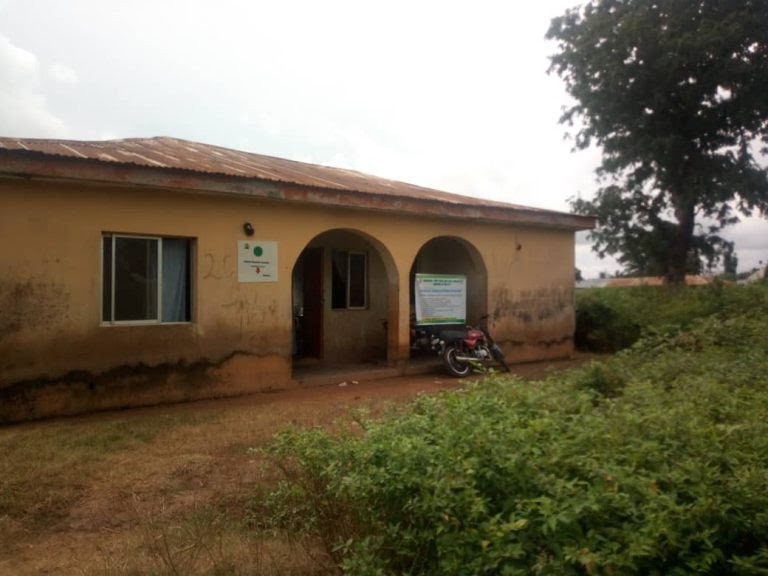
A primary healthcare centre in the nation’s capital
Sadly, while citizens suffer from the brain drain, politicians and government officials never hesitate to travel overseas for medical treatment when the need arises – Nigerians reportedly spend $1bn for medical treatment abroad every year, with the country’s number one citizen known for seeking medical care abroad. The president spent 152 days – out of the 365 of 2017 – in the UK receiving treatment. And while Isaac Adewole, minister of health, thinks being a government official should not stop one from such luxury, the professor of gynaecology and obstetrics also believes some medical doctors will end up as farmers and – wait for it – the minister confirmed his tailor is a doctor! A medical doctor!
THE WAY OUT
In 2018, the 8th senate took a major step towards ensuring adequate funding for the health sector by approving one per cent of the consolidated revenue fund for the Basic Health Care Provision Fund (BHCPF) in the 2018 budget — first of such approval in the annual budget since 2014 when the fund was created.

With the approval, a total sum of N57.1 billion went into the fund for basic health care coverage in the country, in addition to the N269 billion already approved for the health sector. While this is commendable, it is still not enough to cater to the health needs of Nigerians and salvage the nation’s decaying health sector.
TheCable made several calls to Adewole’s line to get his reaction on the recruitment exercise but they were not answered. A text message sent to him was yet to be responded to as at when this story was filed.






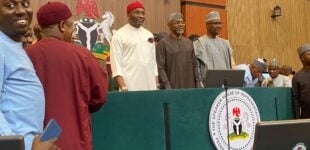


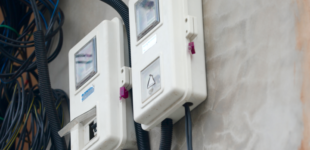




There are no comments at the moment, do you want to add one?
Write a comment